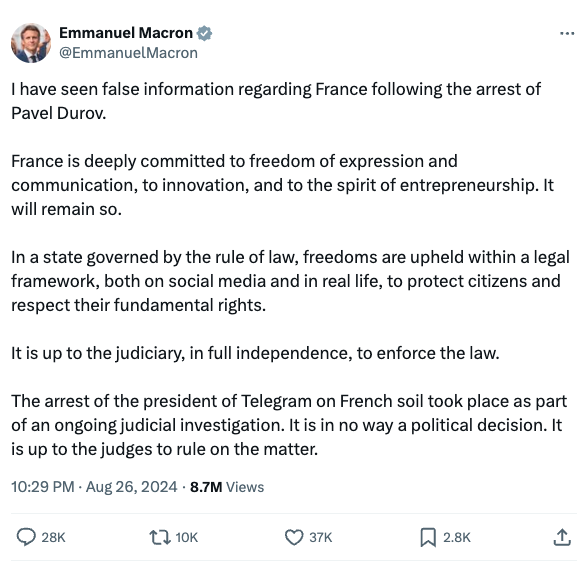Multiple French government websites have been disrupted due to a denial of service (DDoS) attack, with suspicion falling on a Russian hacker group. This cyber onslaught has impacted several key sites, including the Administrative Court of Paris, the French Health Department’s ansm.sante.fr site, and the Court of Cassation’s page, rendering them inaccessible and raising security alerts about unsafe connections.
The timing and intensity of the attacks suggest they may be in retaliation for the recent arrest of Telegram founder Pavel Durov in France on August 24. Initial analyses by Entropia Intel point to this geopolitical tension as a likely catalyst for the cyberattacks, indicating a complex interplay between international relations and cyber warfare.
Durov’s Arrest and Political Repercussions
French President Emmanuel Macron addressed the controversy surrounding Durov’s arrest, stating that it was not politically motivated. He emphasized France’s dedication to freedom of speech and expression, assuring that the judiciary, independent of the political system, would determine the outcome of the case. However, Macron’s comments have sparked significant backlash from the cryptocurrency community and advocates of free speech, questioning the fairness and legality of the arrest procedure.

Criticism from the Crypto Community:
- Gabor Gurbacs, former VanEck director for digital asset strategy, expressed skepticism about the rule of law in France, questioning the arrest-first, justify-later approach.
- Vitalik Buterin, Ethereum co-founder, and Elon Musk, billionaire entrepreneur, were among prominent figures calling for Durov’s release, highlighting concerns over the implications for software and communication freedoms in Europe.
French prosecutors have stated that Durov could be held for questioning until August 28 concerning activities by an “unnamed person” using the Telegram platform. As of now, Durov has not been formally charged with any crime, nor has any legal wrongdoing been demonstrated, leaving his detention in a precarious and widely criticized position.
Implications of the Cyberattacks
The DDoS attacks on French government websites underscore the vulnerability of digital infrastructures to geopolitical tensions. These incidents highlight the need for robust cybersecurity measures, especially for governmental and critical infrastructure which can become prime targets during international disputes.
In response to these cyberattacks, it is crucial for the French government and other entities to enhance their cybersecurity protocols to prevent future incidents. This includes:
- Regular updates and patching of systems to fix vulnerabilities that could be exploited.
- Enhanced monitoring and intrusion detection systems to quickly identify and mitigate unauthorized access.
- Training and awareness programs for employees to recognize and respond to cybersecurity threats effectively.
The international community’s response to these attacks and Durov’s arrest will likely influence future diplomatic interactions and policies regarding cyber governance and freedom of expression. As digital platforms continue to play a pivotal role in global communication and politics, the balance between national security, personal privacy, and freedom of speech will remain a key area of contention and dialogue among nations.
The cyberattacks on French government websites amidst the controversial arrest of Pavel Durov highlight the intertwined nature of technology, politics, and law. As France navigates the fallout from these events, the global community watches closely, understanding that the outcomes could have far-reaching implications for digital freedom and international cybersecurity strategies.










